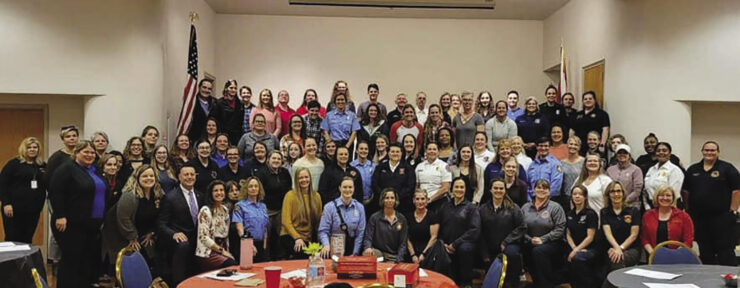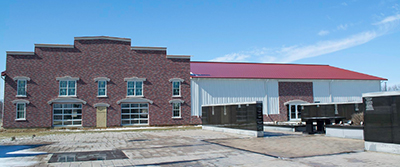Proudly Serving!
In May 2022, nearly 100 women firefighters representing career and volunteer departments met in Jefferson City. The monumental gathering was the first to focus on issues pertaining to women in the fire service and discussions centered around recruitment, retention, health and wellness, and discrimination and harassment. While the symposium was a chance for the Missouri Division of Fire Safety to hear the experiences and needs of women firefighters, the real value was the chance for women to meet, network, and share stories. Migrating from all corners of the state, many of the women in attendance were the first and/or only women in their department, placing a premium on the time they had with each other.
Nationally, women make up less than ten percent of the fire service. Less than five percent of career firefighters are women, while just over ten percent of volunteer firefighters are women. These figures are shockingly low when compared to similar public safety occupations, as close to 15% of law enforcement officers are women, while women comprise over 18% of the military. While 7.5% of Missouri’s registered firefighters are women, the state, similar to the national landscape, still struggles with a fire service unprepared for a diverse workforce. As the national fire service navigates a fast-paced social climate, many previously obscure work-related concerns are coming to light. For women firefighters, this includes a lack of policy guidance regarding reproductive health, toxic work environments, and stalled promotional progress.
A topic thoroughly discussed at Missouri’s symposium, the reproductive health of firefighters has recently come into focus on a national level. Specifically, women who experienced pregnancy in the fire service were often left without policy-driven guidance, lactation privacy, or standardized return-to-work procedures. Additionally, exposure to toxins and carcinogens has resulted in an increased risk of miscarriage, preterm birth, low birth rates, and male- and female infertility. Furthermore, the health of minority firefighters is greatly influenced by non-inclusive fire departments. Experiences related to harassment and discrimination may be common among firefighters struggling to fit into station culture and may result in higher rates of work stress, mental health concerns, and substance use. These concerns, mixed with an already low number of women firefighters have left a shortage of women leadership at the top of fire departments as less than 2% of fire chiefs in the United States are women. As fire departments struggle with recruitment and retention, this insight into the experiences of women firefighters is valuable for the field to move forward.
Still, in the early stages of its infancy, the Missouri Women of Fire was born out of a need to address these important issues faced by women firefighters, in addition to a deep desire for women firefighters to continue the connections and support they experienced last year in Jefferson City. Missouri Women of Fire will be open to all women firefighters in Missouri including career and volunteers. Similar to the fire service, Missouri Women of Fire will honor the trailblazing women who broke down barriers and created new career opportunities, while creating a culture of empowerment and responsibility. Placing a heavy emphasis on mentoring, these women are committed to providing a foundation of excellence and creating a more inclusive Missouri fire service. More information about how to join will be forthcoming as the group continues to solidify its Mission and Vision and begins the recruitment process. Missouri Women of Fire: Formed by the Past, Guiding the Future.


































